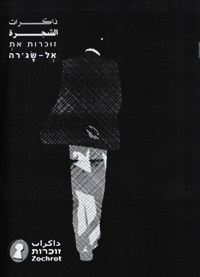Excerpt from the booklet:
AL-SHAJARAH
The site of Al-Sajarah Village, 14 km to the west of Tiberias and about 3 km south of Lubyeh, just beside the road leading south from the Galilee to Affula and Bisan. Ruins embracing life": This is the first thing one sees when coming from the main road to Al-Sajarah site. Al-Sajarah was the home village of Martyr Naji el-Ali (most famous Palestinian caricature drawer), and we can imagine that this was his parents' house... or one similar to this.
Al-Sajarah was destroyed by the Israeli army right after the occupation in 1948 and the years after, and the refugees from the village live in the villages of the Galilee, in the refugee camps on the West Bank, Syria, Lebanon and in various parts of the Palestinian diaspora.
The land area of Al-Sajarah, however, (which amounts to over 3700 Dunam) is now the property of the Jewish settlements built on it, the state, and the agricultural station of Chavat Hashomer.
The great Palestinian poet Abd al-Raheem Mahmoud (who was born in 'Anabta in Tulkarm district) was killed by the Israeli forces during a battle in the village on July13, 1948. He was later buried in Nazareth
NAJI AL-ALI 1936-1987
From The Encyclopedia of the Palestinians, edited by Philip Mattar
Born in the Galilee, al-Ali fled with his family to southern Lebanon during the ARAB-ISRAELI WAR OF 1948 and spent his youth in the Ayn al-Hilwa refugee camp. He began drawing cartoons on the walls of Lebanese prisons during the late 1950s and was later encouraged to publish his cartoons by the famous Palestinian writer GHASSAN KANAFANI.
Al-Ali later moved to Kuwait in the early 1960s. Returning to Lebanon in 1971, al-Ali served on the editorial board of the prominent Lebanese newspaper al- Safir and also contributed cartoons to other prominent Arab newspapers.
Al-Ali's cartoons were often biting commentaries on life in the Middle East. Each cartoon featured a young boy, Hanzala, as spectator. Fiercely independent, al-Ali sought to defend what he believed was the common Arab man and woman and alienated a host of regimes and political movements in the process. Al- Ali left Lebanon in 1983 for Kuwait out of fear for his life; however, he was expelled in 1985 under pressure from neighboring Saudi Arabia and moved to London. He was shot by an unknown assailant on July 22, 1987,and died on August 30 of the same year. Al-Ali was posthumously awarded the International Federation of Newspaper Publishers' Golden Pen Award in 1988 to recognize his contributions to freedom of expression.
Download File



